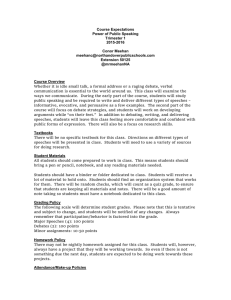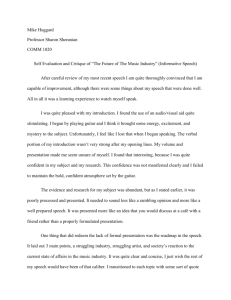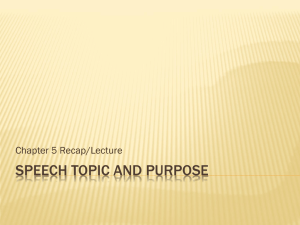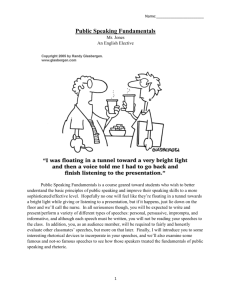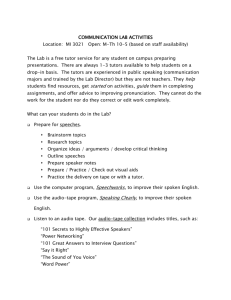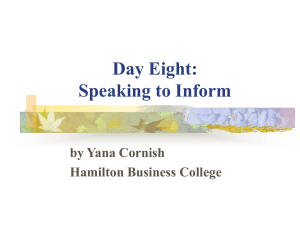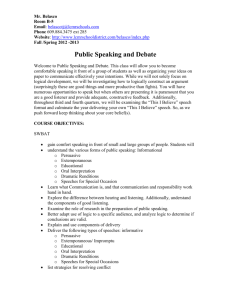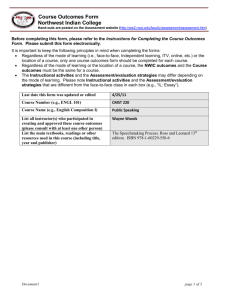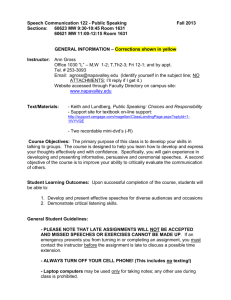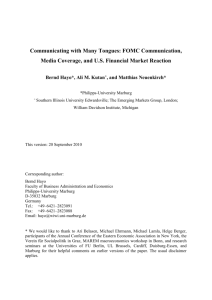chARTer~TECH High School for the Performing
advertisement
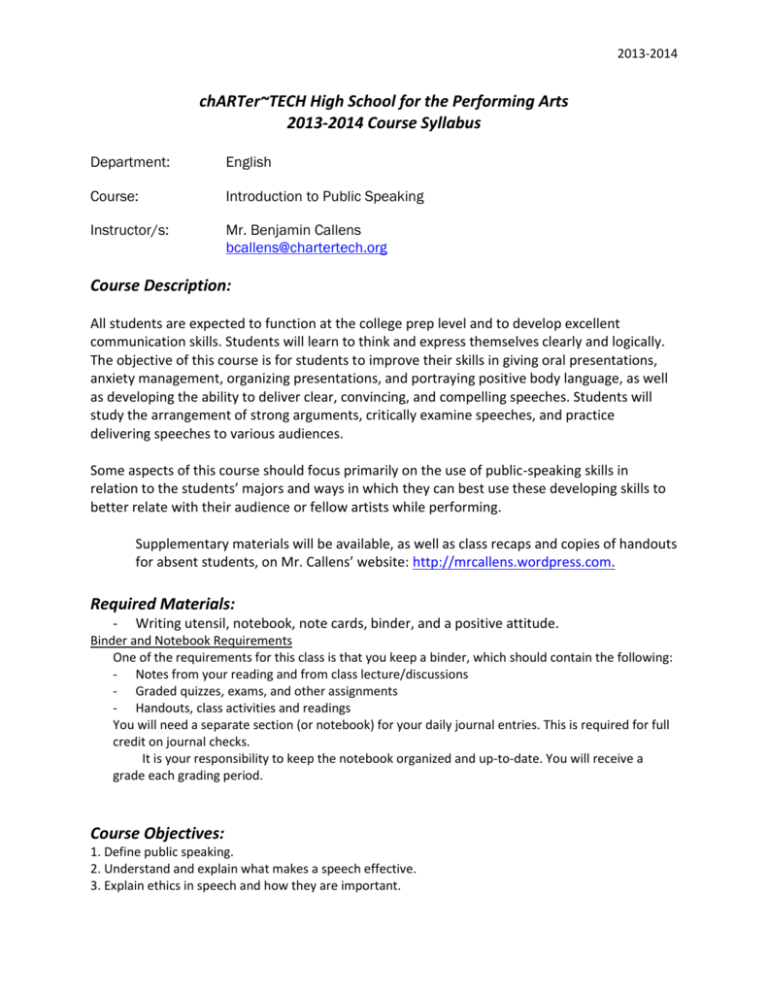
2013-2014 chARTer~TECH High School for the Performing Arts 2013-2014 Course Syllabus Department: English Course: Introduction to Public Speaking Instructor/s: Mr. Benjamin Callens bcallens@chartertech.org Course Description: All students are expected to function at the college prep level and to develop excellent communication skills. Students will learn to think and express themselves clearly and logically. The objective of this course is for students to improve their skills in giving oral presentations, anxiety management, organizing presentations, and portraying positive body language, as well as developing the ability to deliver clear, convincing, and compelling speeches. Students will study the arrangement of strong arguments, critically examine speeches, and practice delivering speeches to various audiences. Some aspects of this course should focus primarily on the use of public-speaking skills in relation to the students’ majors and ways in which they can best use these developing skills to better relate with their audience or fellow artists while performing. Supplementary materials will be available, as well as class recaps and copies of handouts for absent students, on Mr. Callens’ website: http://mrcallens.wordpress.com. Required Materials: - Writing utensil, notebook, note cards, binder, and a positive attitude. Binder and Notebook Requirements One of the requirements for this class is that you keep a binder, which should contain the following: - Notes from your reading and from class lecture/discussions - Graded quizzes, exams, and other assignments - Handouts, class activities and readings You will need a separate section (or notebook) for your daily journal entries. This is required for full credit on journal checks. It is your responsibility to keep the notebook organized and up-to-date. You will receive a grade each grading period. Course Objectives: 1. Define public speaking. 2. Understand and explain what makes a speech effective. 3. Explain ethics in speech and how they are important. 2013-2014 4. How to effectively use visual aids. 5. Produce aesthetically pleasing and informative Power Point presentations. 6. Illustrate how a Power Point is useful to a speaker but should not drive the presentation. 7. Utilize public speaking techniques to create memorable and engaging artistic performances. 8. Explain the role of the audience for a speaker. 9. Identify how analyzing an audience is crucial for effective speeches. 10. Explain how to responsibly use primary and secondary sources. 11. Design interesting introductions and dynamic conclusions. 12. Understand the importance of being seen as credible and how to achieve that. 13. Utilize skills from the class to become an effective speaker during social situations and special ceremonies. 14. Apply classroom exercises and skills to make a positive difference in performances of their major. 15. Explain how understanding concepts of writing speeches will allow them to become better writers overall. 16. Develop a personalized plan to help overcome speech anxiety. Assessment: Various tests, essays, projects/speeches, quizzes, classwork, and homework assignments. Grading Policy: Classwork/Homework 20% - A participation grade will be given every Friday. Behavior, attitude, and preparedness for class will be the basis for this grade. Daily warm-up activities will be checked and also counted as a classwork grade. Essays/Speeches 25% - At least 3 essays/speeches will be written a marking period - Grading rubrics will be given for each essay and will vary based on the individual essay topic Tests 25% - At least 2 tests will be given a marking period - Each test will include multiple choice and the possibility of a 5 paragraph essay Quizzes 15% - At least 3 quizzes will be given a marking period Projects 15% - At least 2 projects will be given a marking period - Individual rubrics will be given for each individual project - Projects will include power points, skits, monologues and any other assignment tied to the arts Each marking period will account for 20% of the overall final grade and the midterm and final will each account for 10% of the overall final grade. 2013-2014 Classroom Policies: 1. Headphones are only to be worn during independent work. Cell phones may only be used with permission. When not in use, both of these electronics must be put away (not on the desk or in your ears). 2. Turnitin.com will be used for every writing assignment. 3. Late work will lose 10 points (or one letter grade when applicable) each day the work is not turned in and cannot be turned in later than one calendar week after due date under normal circumstances; some exceptions may apply. (Note: one day means one calendar day, not each day that we meet). 4. Take care of all personal grooming before entering class. If you choose to break this rule your grooming products may be confiscated and not returned. 5. Come to class on time and prepared. 6. While there will be days with open group discussion, during more formal, teacher-directed lessons, please raise your hand and be recognized before speaking. Calling out during notes or lecture is distracting for both students and the teacher. 7. If you did not walk into the classroom with it, it does not belong to you. Please ask permission before using any classroom materials (including tape, stapler, etc.), charging your phone, or getting on the computer. 8. When leaving class, please take all belongings with you. This includes all trash and pieces of paper you may have received in class. Maintaining a clean room is an individual responsibility, not the teacher’s nor the custodian’s. 9. Lateness to class without a pass will be treated with a lunch detention. Repeated offenses will be referred to the discipline committee. 10. Please no eating in class. It smells and is distracting. Beverages with a lid are fine; however they must be kept in your bag and not out on the desks. Course Outline: I. II. III. Foundations of Public Speaking A. Define Public Speaking B. Ethics C. Speaking Style D. Audience Developing Confidence over Speech Anxiety A. Symptoms and Causes of Anxiety B. Anxiety Management C. Using Anxiety-Reducing Techniques to Create More Entertaining and Memorable Artistic Performances. Preparing to Speak A. Analyzing an Audience B. Primary Resources C. Developing a Thesis 2013-2014 IV. V. VI. VII. VIII. IX. D. Speaker Credibility Organizing Your Speech A. Elements of a Good Introduction B. Effective Conclusions C. Smooth Transitions D. Outlining Your Speech E. What Should Be Avoided Developing Your Speech A. Perceived Credibility B. Creating Good Arguments C. The Importance of Speech Language D. Using Emotional Appeals Presenting Your Speech A. Visual and Auditory Aids B. Handouts C. Using Power Point Delivery A. Body Language B. Practicing Delivery C. Keeping Your Speech Conversational D. Impromptu Speech E. Responding to Difficult Audience Members Extemporaneous Speeches A. Presenting: Epidemic! B. Peer Review Practice with Different Styles of Speeches A. Social and Ceremonial Speeches B. Emotional Speeches C. Group Presentations
